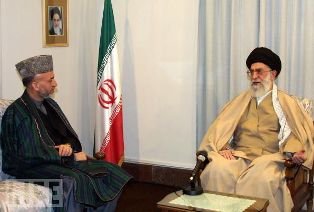Iran Looking to Influence Strategies in Afghanistan
By Hanan Habibzai, STAFF WRITER
The presence of Iranian diplomat in a key international meeting raised concerns over Iran’s controversial role in Afghanistan.
It is first time, an Iranian representative attending a meeting on Afghanistan’s development issues organised by an international group. ‘’Iran will attempt to influence international strategies, if it regularly allowed attending such meetings ‘’ A Kabul University student Qadimullah Masoomi expressed his concerns.
According to The New York Times, the move welcomed Monday by both the American and international officials. A high ranking Iranian diplomat Ali Qanezadeh was also present at a briefing by Gen.David H Petraeus on NATO’s strategy for transition in Afghanistan.
The Double game in Afghanistan
At the meantime some sources within Hamid Karzai government are thinking that Iran is aiding the Taliban.

They say several Iranian citizens have been held in Afghanistan for supporting the insurgency.‘’Iran can not see the American presence in Afghanistan and that’s why continuingly interfering Afghanistan’’.
Mr Masoomi added. Some officials in western Afghanistan claimed that Iran is training “a huge number of political opponents of the Karzai government in a refugee camp in Iran called Shamsabad.
Iran claims sympathy with Afghanistan but many Afghans are accusing the western neighbour perusing its own agendas in Afghanistan to increase their influence across the country for gaining certain interests.
Local population in Western Afghanistan expressed concerns over Iran’s widespread influence in the area.They urged, it is the right time for US to move its authority toward Afghan border with Iran.
Afghanistan, The Historical Background
During the Soviet invasion of Afghanistan in 1980s ,Russian ambassador to Afghanistan considered as a key foreign diplomat in Kabul who had enormous influence on internal and foreign Afghan policy and decisions.
After the US-led invasion of Afghanistan in 2001, Iran succeeded to gain the same role Russian diplomat was playing in Afghanistan.
Iranian ambassador was quick to increase its dominant lengths within Afghan government and extend its authority to remove or employ key security and civilian officials across Karzai’s government.
Iran gradually more invests on Afghan media and no one can speak freely against Iran in the streets of Kabul.
Few months ago, Iran succeeded to pressurise media and imposed ban through Afghan attorney general on a private TV channel Amroz, a critic of Iranian regime.
Iran’s religious leaders are extremely influential in the region and their views are particularly dominant in Shiite areas. Maintaining this influence is the key to Iran’s expansion plans, Iraq is a route to Surya, Lebanon, Palestine and even Israel.
Iran has effectively created a tunnel for itself through across the Middle East, supplying and arming extreme groups in Iraq, Syria, Lebanon and Palestine.
The success of its plans will eventually lead to the destabilisation of Sunnite Yemen and Saudi Arabia, creating the power vacuum Iran wants in Central Asia.
What does all this mean? A small mistake by the US in its Middle East policy could result in the country upping the pace of its plans. An Iranian dominated Middle East would pose a major threat to the West, Afghanistan, Israel and even Pakistan.
To put it simply, if America leaves Afghanistan, Iran will step in to increase its influence in the Central Asian and Middle Eastern countries through that region. Already Iran has its claws in Afghanistan.
It provides financial and political support to the religious Shiite minority, while thwarting the religious worship if the Sunnite minority in Tehran.
The Sunnites who dare to have their own religious centres face detention, whereas Iran spends millions of dollars to build a dominant Shiite religious centre in the heart of Kabul.
The majority Pashtuns in Afghanistan fear that their religion and power will be in danger in an Iran-controlled Afghanistan. Iranian influence in the region will almost certainly destroy international efforts for peace efforts in the entire region.
Iran’s hand can also be seen in Afghanistan’s neighbour Tajikistan where its influence is widespread.
Talks on how to tackle Iranian agendas should include discussion of the issue I have raised. Ignoring the creeping hand of Iran will disturb peace efforts not just in Afghanistan, but across the entire region.

Hanan Habibzai, an investigative journalist with more than ten years of experience in global journalism has covered the US invasion of Afghanistan, the fall of the Taliban regime, and post-Taliban developments, including the rise of militancy in the country.
MA in global journalism from Coventry University, Hanan writes on the conflict in Afghanistan and the regional politics, his work has been published by the BBC Afghan Stream, Pajhwok Afghan News, Reuter’s news agency, the Washington Post, Veterans Today, several local and the global media agencies, Including contribution in a journalism book Afghanistan War and the Media: Deadline and Frontline (2010), edited by R, Keeble & J, Mair, Hanan’s academic work is published around the world.
ATTENTION READERS
We See The World From All Sides and Want YOU To Be Fully InformedIn fact, intentional disinformation is a disgraceful scourge in media today. So to assuage any possible errant incorrect information posted herein, we strongly encourage you to seek corroboration from other non-VT sources before forming an educated opinion.
About VT - Policies & Disclosures - Comment Policy



